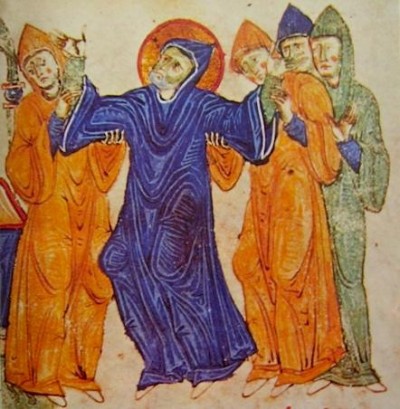The brethren shall rise

CHAPTER VIII
Of the Divine Office at Night
10 Feb 11 June. 11 Oct.
In winter time, that is, from the first of November until Easter, the brethren shall rise at what may be reasonably calculated to be the eighth hour of the night; so that having rested till some time past midnight, they may rise having had their full sleep. And let the time that remains after the Night-Office be spent in study by those brethren who have still some part of the Psalter and lessons to learn. But from Easter to the first of November let the hour for the Night-Office be so arranged that, after a very short interval, during which the brethren may go out for the necessities of nature, Lauds, which are to be said at day-break, may follow without delay.
The passage from Chapter VII (On Humility) to Chapter VIII (On the Divine Office during the Night) is, in effect, the monk’s passage from the passion and death of Christ to His holy resurrection, His ascension, and His priesthood of glory, for “Jesus is not entered into the holies made with hands, the patterns of the true: but into heaven itself, that he may appear now in the presence of God for us” (Hebrews 9:24). Chapters V (On Obedience), VI (On Silence), and Chapter VII (On Humility) describe the means by which a monk is configured slowly — and not without tears, falls, and hours of darkness — into a living image of the Suffering Servant. This is the very program that Saint Benedict sets before his sons at the conclusion of The Prologue of the Holy Rule:
As we go forward in our life and in faith, we shall with hearts enlarged and unspeakable sweetness of love run in the way of God’s commandments; so that never departing from His guidance, but persevering in His teaching in the monastery until death, we may by patience share in the sufferings of Christ, that we may deserve to be partakers of His kingdom.
At the summit of the twelve degrees of humility, the monk enters into the victimhood of Jesus who, “bowing His head, gave up His spirit” (John 19:30). A man comes to the monastery to place himself upon the altar, to be immolated with Christ, “the Lamb who was slain from the beginning of the world” (Apocalypse 13:8). A man comes to the monastery to live and to die in the hands Christ the Priest, as a sacrificial victim made over to the Father. Benedictine life cannot be understood apart from this identification with Christ, “the pure victim, the holy victim, the spotless victim” (Roman Canon). The ultimate meaning of Benedictine life, as illustrated in Saint Benedict’s own Eucharistic death, lies in the priesthood and victimhood of Christ on the altar of the Cross and in the Holy Sacrifice of the Mass. Chapters V, VI, and VII of the Holy Rule are the three steps by which a man ascends to the altar whereupon his life becomes, as Saint Augustine says in Book X of The City of God, a sacrificium, an offering made over to God by immolation. A thing immolated cannot be restored to its former use. Sacrificial immolation is that by which a thing — or a person — is made over to God irrevocably, trusting Him to accept what is offered, to make it fruitful, and to resurrect it to His own glory.
I appeal to you therefore, brethren, by the mercies of God, to present your bodies as a living sacrifice, holy and acceptable to God, which is your spiritual worship. (Romans 12:1)
The head of Christ bowed in death that Saint Benedict evokes in the 12th degree of humility of Chapter VII becomes, in Chapter VIII, the head of Christ the High Priest raised in glory:
In thy strength, O Lord, the king shall joy; and in thy salvation he shall rejoice exceedingly. Thou hast given him his heart’ s desire: and hast not withholden from him the will of his lips. For thou hast prevented him with blessings of sweetness: thou hast set on his head a crown of precious stones. He asked life of thee: and thou hast given him length of days for ever and ever. His glory is great in thy salvation: glory and great beauty shalt thou lay upon him. For thou shalt give him to be a blessing for ever and ever: thou shalt make him joyful in gladness with thy countenance. (Psalm 20:2–7)
Chapter VIII inaugurates Saint Benedict’s treatment of the Opus Dei, the Work of God, which is nothing other than the Church’s participation in time in the glorious priesthood of the risen and ascended Christ in eternity. Saint Benedict begins, I think, with the Night Office because the resurrection of the Lord took place in the secret of the night.
O truly blessed night, which alone deserves to know the time and hour when Christ rose again from hell. This is the night of which it is written: And the night shall be as light as the day, and the night is my illumination in my delights. Therefore the sanctification of this night blots out crimes, washes away sins, and restores innocence to sinners, and joy to the sorrowful. (The Exultet or Praeconium Paschale)
